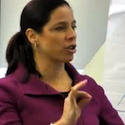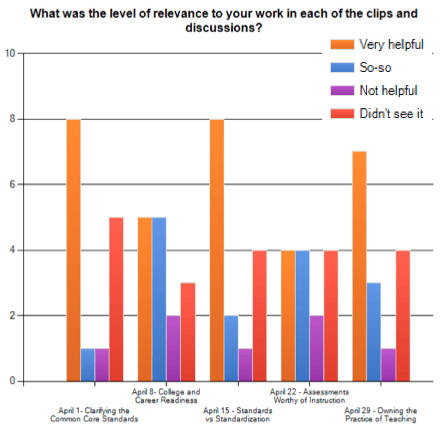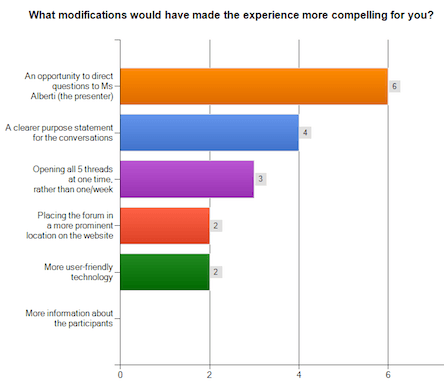
During the month of April, 2013, Northeast TURN sponsored an online "Follow-Up Forum" on the topic: "Gearing Up for the Common Core." Five video clips were used as discussion starters. The clips were taken from a keynote presentation by the same name, presented by Sandra Alberti, Student Achievement Partners, at the March 1-2, 2013, meeting of NE TURN. The clips were produced by Zack Wiseman, Virtual Community Organizer for NE TURN. Zack collaborated with Gary Obermeyer, Networking Consultant/Webmaster for TURN and the TURN Regions, in designing and facilitating the Follow-up Forum.
The inspiration for the Follow-Up Forum came from Zack and his passion for video as a means of communicating ideas and issues. He researched the basic equipment needed to produce quality video and wrote a proposal to secure funding. Zack recorded all the main presentations at the March, 2013, meeting of Northeast TURN; then edited clips from each to capture key points, and posted them on YouTube. The regional coordinators (Maureen Logan & Kathleen Casasa) were especially impressed with the video clips of Sandra Alberti, talking about the Common Core. Mary McDonald, Regional Coordinator for Great Lakes TURN, and manager of the project, suggested that the topics be presented in a sequence rather than all at once.
Gary did the set-up for the forum in consultation with Zack, ordering the clips with the audience in mind - building toward a key reason why teacher unions are embracing the Common Core: Owning the Practice of Teaching. Gary embedded the clips in separate threads within the Follow-Up Forum and wrote discussion prompts to frame the key idea(s) presented in the videos. Zack took the lead in sending announcements to the participants as each new thread was launched:
| thread | launched | page views | responses |
|---|---|---|---|
| Clarifying the Common Core Standards | April 1 | 159 | 15 |
| College and Career Readiness | April 8 | 87 | 7 |
| Standards vs Standardization | April 15 | 103 | 11 |
| Assessments Worthy of Instruction | April 22 | 76 | 6 |
| Owning the Practice of Teaching | April 29 | 41 | 3 |
| Totals | - | 466 | 42 |
For the registration, we used an online survey to get a sense of participants needs and experience related to the Common Core (Common Core Follow-Up Forum Participant Survey). We created a group to facilitate the sending of announcements and to control access to the forum, i.e. to assure a safe space for conversation. Participants had the option of receiving email notification each time a new comment/question was posted (which also provided links to the posting), or to receive the weekly announcements only.Zack did most of the promotion for the Forum via email and Facebook, and with the help of the Regional Coordinators, resulting in 72 registrations, including 16 teachers, 7 local presidents (plus 1 V.P.), 4 state presidents, 4 local union staff, 9 state union staff, 7 national union staff, 4 district administrators, 6 TURN leaders, 3 consultants, and a smattering of others.In terms of involvement with CCSS - all but four participants (67 total) indicated that their organization is supporting CCSS implementation, and of those, 52 are personally involved in the work.This was the first TURN event for 38 of the participants (just over half of the total). Twenty-two participants had attended a meeting of NE TURN (11 of those attended the March 1-2 meeting), 24 had attended a national TURN meeting, and 13 had attended both. View the participant list.
The Discussion Prompts (click the titles to view the video clips):
- Clarifying the Common Core Standards - In this clip (1:48 minutes) Sandra Alberti explains that the Common Core State Standards are designed to be fewer in number, clearer, and at a higher level. We invited the participants to discuss the extent to which the CCSS intentions match the reality of their experience and potential implications for our work, together, as participants in the Regional Network.
- College and Career Readiness - In this clip (2:16 minutes) Sandra Alberti talks about the need to rally around the belief that our education system needs to be set up so that everyone has access to success in college and careers. "We are getting ready for the sea change in preparing all kids ready for life after high school," says Alberti, "our system has not been focused on this at the past." She invoked the work of leadership expert Jim Collins and his call for BHAGs (Big Harry Audacious Goals) to motivate and energize people. We asked the participants, "What do you think? Are we talking about a sea change? How can our education system meet the challenge of assuring that everyone has access to success in college and careers? Is Common Core the means to do that? Is it a BHAG?"
- Standards vs Standardization - In this clip (3:36 minutes), Sandra Alberti, makes the point that there is a huge distinction between standards and standardization. The Common Core State Standards are intended to shift from a "coverage" mentality to more focused and deeper learning. The promise of the CCSS is that fewer, clearer, higher standards will enable greater innovation in schools and classrooms. "If we truly believe that these standards apply to all students," Alberti insists, "the skills of teachers...is what's ratcheting up here." This thread was targeted at participants farthest along in CCSS implementation to learn how the distinction between standards and standardization plays out in practice.
- Owning the Practice of Teaching - Because this clip is quite short (45 seconds) we included the full transcript: "Can we finally believe, whether we are feeling it or not, that the whole reason why we need good measures of educator effectivess, is so we can get better teachers? That we need to agree what excellence is and then figure that out… I guess that's what Jo [Anderson] was saying on the panel: 'we need to buy into this fact that we can all get better at our practice.' But, in order for me to get better at my practice, I need to believe in the system by which I am measured. Right? I don't need someone outside agency making some judgement that I don't believe on. Like how does that motivate me to get better? But, we all own this system and this process (we should always want to get better at our craft) and that's what this all needs to be about."
Participant Feedback
Fifteen of the 72 participants responded to a follow-up survey at the conclusion of the Follow-Up Forum (5 school staff, 4 union leaders, 1 district administrator, 1 higher ed faculty, 2 consultants, and 2 other).
Nine of the respondents said they learned about the forum from a TURN leader, while 3 reported learning about the forum from a colleague. Asked about frequency of logging on, three respondents logged in more than once/week, four logged in once/week, 7 logged in less than once/week, and one did not log in during the five week event (technical difficulties).

When asked to compare the experience with expectations, 11 out of the 15 participants selected "pretty close". Expections were exceeded for 1 and "fell short" for the remaining 3. The group was evenly split (8/7) on the question: whether they gained greater understanding of Common Core and the potential for improving teaching & learning? Nine respondents added comments providing clues regarding the expectations question:
- Positives (3)Given many suggestion to link to (for assessment).I was pleased with the design and the active engagement of the participants.It was a useful way to keep the conversation "alive." The number of participants exceeded my expectations and the conversations generated were very intriguing.
- Deficiencies (4)This was very general, and I am really past that in my knowledge as a literacy coach. Would have appreciated seeing actual practice in action.I learned more of CCSS through the GL TURN...my state, thus my familiarity and connection was limited.Because i did not stay the course with the forum - my problem not yours.I was hopeful but realize that people have limited patience. Tried to make it a resource but many of Alberti's points are dubious at best. Her assumptions can be construed as offensive to teachers and that may have turned people off.
- Technical issues (2)It is a little complicated to navigate and not convenient to post.I wasn't able to access the information--could very well have been my fault, and I didn't try very hard since my time was limited.

Finally, we checked for interest in continuing the work with two questions:
- Would you like to have occasional opportunities to view video clips and discussions regarding Common Core? (Response: 100% yes).
- Would you be interested in participating in the TURN Common Core Community of Practice to share resources, experiences, and stories with the intent of leveraging CCSS as a means to assure that teachers own the practice of teaching? (Response split almost evenly - 5/5/4- between the three choices: "Yes, please sign me up"; "Maybe (tell me more)"; and "No, thanks, it's not a priority right now."
So, what lessons do we take from this experience and what does it tell us about possible next steps as we move from coversations to action?




